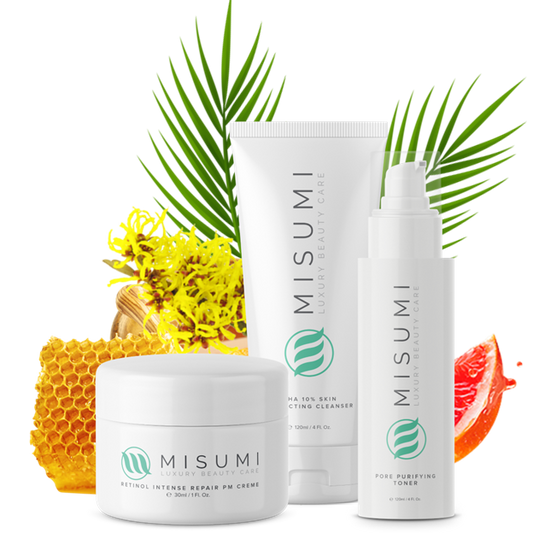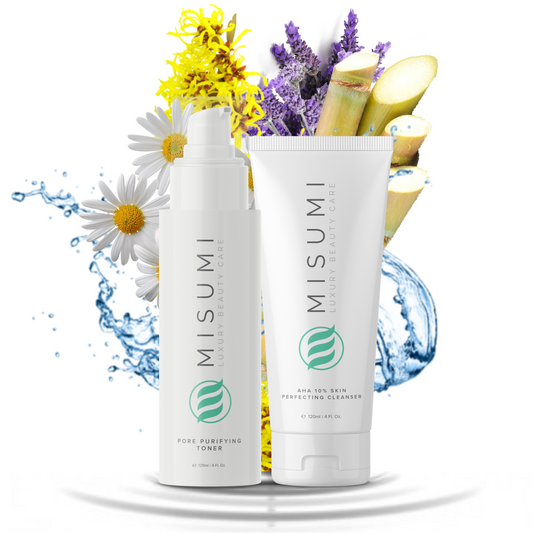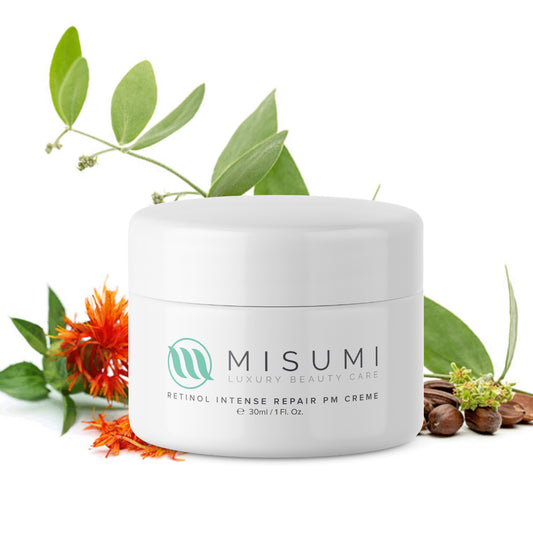Eczema is one of the most prevalent skin conditions known to man but also one of the most poorly understood ones. It can appear regardless of age. From babies to teenagers, adults, and senior citizens, eczema can be insufferable and annoying. While it’s not very dangerous, it can cause a person endless frustration, impacting their physical appearance and emotional well-being.
So what's to be done?
What is Eczema?
Eczema is just a conventional name for a class of skin disorders that are a bit of a puzzle to scientists. Dermatologists classify eczema as atopical dermatitis, meaning it has no known cause.
The “a” in “atopical” means it negates a “topical” (or local) cause of the disorder. Hence, there are no specific known irritants or substances that have come into contact with the skin to lead to the appearance of atopic dermatitis. In other words, it also means that almost anything can cause eczema or atopic dermatitis based on a person’s genetics and surroundings.

But to understand eczema or atopic dermatitis better, we need to look at its opposite - or what it is not.
Contrary to eczema and other manifestations of atopical dermatitis, topical dermatitis always has a known cause. The causal factors are usually substances in the environment that have come into contact with the skin. These substances are known as irritants or allergens when contact dermatitis escalates to an allergic reaction.
A good example of this is the burning people sometimes experience when slicing lemons. Lemon juice is highly acidic, so when it comes into contact with healthy but probably sensitive skin, it can cause irritation. This usually manifests itself as redness in the affected area, accompanied by sensations of burning or itching.
Take everything about contact dermatitis, but remove the known, topical causes, and you have eczema - or atopical dermatitis. Medical professionals can’t put a finger on what the underlying causes are, but they often suspect it is allergic in nature. This is because eczema often appears in individuals who already have allergies, such as asthma.

Eczema symptoms are manageable and, in some cases, even treatable. It's important to act quickly and treat it as early as possible, which for around 90% of people is during the first five years of their life. This often means that the responsibility for treating eczema falls on the parents. Regardless of parents' diligence, only around 40% of children rid themselves of eczema by adulthood. This means that the remaining 60% of people with eczema still need to treat their dry skin in adulthood.
How to Take Care of Eczema-Prone Skin
Being a complicated skin condition with several symptoms, eczema requires treatment from many different angles targeting its different aspects. While there is no magical cure, there are many eczema treatments available. It's not impossible to alleviate your eczema flare-ups and make yourself feel better.
The following advice will work on almost anyone who suffers from eczema, but it’s mainly geared toward adults. Adult eczema can be more specific than its childhood version, but some methods can help with both.
Dealing With Adult Eczema
Adult eczema brings its challenges. Most of the time, the number one problem that adult eczema presents for people is its location. As we age, our skin changes its thickness, and by the time we are adults, it’s the thinnest on our faces. The skin is the most sensitive where it’s thinnest, which makes the face one of the favorite spots for adult eczema to flare up.

While the cause is undetermined, this also means that the cause can be anything. Oftentimes, adult eczema flares up due to different skincare products, makeup products, a hyped-up shampoo, or a new type of soap. People with adult eczema usually get it around their eyes, specifically their eyelids. This can be caused by anything, from a new cosmetics product to that new detergent or even the lining on your pillowcases. Whichever it is, you’ll need to treat your eczema, refrain from itching, and track down the cause of the irritation.
But adult eczema doesn’t only affect the face; it can also appear on random parts of the body, making your skin sore and thicker. If it's not treated, this particular placement of eczema can cause the area of the skin to become discolored and develop scars.

If you’re already experiencing eczema flare-ups, it will likely manifest in other areas of your body. One of the most common body parts is the hands. They are exposed to the greatest number of irritants and allergic triggers from both natural and cosmetic sources. Excessive washing is not recommended since it chips away at the protective skin barrier, which, once damaged, can cause itching and pain.
Controlling the Itch of Eczema
The most annoying symptom of eczema is, by far, its unbearable, persistent itch. People often end up hurting themselves to scratch the itch away, but all it achieves is additional soreness. Most times, the sensation of itching signifies the first symptom of an eczema flare-up. Not only that, but eczema often causes your skin to flake. Sometimes, when you scratch too much, you can cause yourself wounds and scabs.
Scratching will just worsen eczema. When you scratch skin affected by eczema, it stimulates the nerve endings under the skin, which causes the area to become overstimulated and inflamed. This, in turn, fuels the already present inflammation, intensifying the rash and causing even more intense sensations of itching.

Scratching often leads to injuries, inviting infection on your skin. Infected eczema makes the entire situation worse, negating any progress you have already made in treating this type of atopic dermatitis. You’re also burning all the money you spent on anti-eczema creams, eczema lotion, and anti-inflammatory medicines.
Train Yourself To Resist The Itchy Triggers
You will need to find ways to train your mind to become more disciplined and research how to resist reacting to your itchy triggers.

Being aware of how it happens and when it happens to you can help a lot. You can’t prevent what you’re not aware of, and once you become attuned to how your body and mind react to the triggers, it'll be easier to stop yourself. However, this process takes time, and you'll need to be very patient with yourself.
Cold Temperatures Can Help Subdue The Eczema Itch
Whenever you have itchy skin, you can defuse it by applying some ice to the area.
This eczema treatment is best used at home when you can apply it at your leisure. Simply place an ice pack over the area of the skin affected by eczema.

Cooling the area has two beneficial effects when soothing itchy akin. First, the ice lowers the skin's temperature, calms inflammation, and reduces itchiness. Secondly, the freezing sensation of the ice overloads your nerve endings, making them unable to receive the sensations of the itch. The nerves become so overloaded by the freezing cold that they become “numb” to most other sensations.
Soothing Your Skin Can Help With Eczema
When you have eczema, one of your main goals, besides resisting the urge to scratch, is to soothe your skin. This doesn’t just mean applying products or ingredients before going to bed - it also means avoiding irritating or drying out your skin in the first place.
Avoid Drying Your Skin
As we mentioned above, eczema can become worse if your skin has already seen some damage. Every time we wash our hands, the skin's surface, known as the epidermis, changes. Our natural skin oil, called sebum, is significantly reduced, making your skin more vulnerable to the elements and random irritants. This loss of our natural skin oil manifests itself as an overall feeling of dryness.

Additionally, if we use harsh soaps, body washes, or shampoos, our skin is not only left without its protective layer of oil that keeps it protected and elastic, but it’s also deprived of any moisture. This can cause cracked skin. Be careful what you wash your hands, body, and face with, and avoid washing them too much or too often. Otherwise, it may become too dry and make your eczema worse. You need to keep your skin moist and soft.
Adopt Soothing Skincare Routines
If you have eczema or just eczema-prone skin, it's crucial to be mindful of the ingredients you're using in your skincare routine. Most normal skincare products or types of makeup will simply not be an option for you. You’ll need to use specific skincare products that are created for sensitive skin - there are even some products that have been formulated specifically for eczema-prone skin.
But even when you find those, it’s important to read the label carefully and avoid ingredients that can potentially be mildly irritating. While such ingredients can be used on normal skin, they will aggravate your eczema-prone skin and make everything worse. Ingredients you should avoid include retinol, salicylic acid (BHA), alpha-hydroxy acids (AHAs), vitamin C, and every product that contains fragrances and perfumes, such as lanolin. Look for fragrance-free products.

The bad news is that these ingredients are found in most skincare and cosmetic products. Skincare products intended for sensitive skin should not have them; if they do, they'll only be very little.
However, the good news is that there are ingredients out there that are perfect for your eczema-prone skin. One of these is hyaluronic acid, which doesn’t cause irritation to the skin's barrier but still moisturizes your skin pretty well.
Make Sure You Have Gentle Baths
If you have eczema-prone skin, it’s important to be careful about showering and taking baths. Keeping your skin as clean as possible prevents additional skin complications. Therefore, bathing (or showering) is essential, but you should be careful not to spend too much time in the shower. Too much water will remove the natural, protective layer of skin oil from your skin, making it unnecessarily dry.
This dryness can exacerbate the symptoms of eczema or even lead to it. Additionally, you should avoid showering with hot water. It can make the symptoms of eczema, like persistent itching, worse. Keeping the shower temperature at 33°C or lower can prevent further inflammation. When drying, avoid rubbing your skin regardless of how soft your towel is - instead, dab all the water away.

Consider the Clothes You Wear
Clothing is probably the most overlooked factor when living with eczema and eczema-prone skin. The clothes you wear and the materials they’re made of can irritate your skin and contribute to itchiness. Fleece and wool are among the worst offenders because these materials can irritate even normal skin, let alone sensitive ones.
Additionally, wool, fleece, and other materials can isolate your skin without allowing it to breathe. They will make your skin cook and increase the itching. You should also be mindful about what detergents you’re using to wash your clothes since some chemicals can irritate your skin. Detergents that contain lots of coloring agents or perfumes are some of the worst offenders, so if you’re struggling with eczema, avoid them. Always try to keep your clothes clean.

Moisturize, Moisturize, Moisturize
One of the best things you can do to take care of eczema-prone skin is to use a high-quality moisturizer. Most moisturizers alone won't be enough - we recommend using them in tandem with some of the best eczema creams (such as a corticosteroid cream). Combining the two substances makes them more effective and reduces the time you will need to use the corticosteroid cream or other prescription treatments.
Corticosteroid creams are great, but using them too long is generally not recommended. Although they combat itching and can effectively reduce it, you should avoid using them more than twice a day and never more than two weeks in a row. If you need to use corticosteroid creams for a prolonged period, taking at least a week off between two weeks of use is mandatory.
Emollient-rich moisturizers that make your skin softer work very well too. Naturally based, quality moisturizers protect the skin from drying out by regenerating your skin’s moisture barrier. When you’re next shopping, be on the lookout for moisturizers that contain substances called ceramides. Ceramides have shown good results in patients dealing with eczema.
If you’re also using a cleanser, apply a moisturizer after cleaning your face. This will help your skin retain moisture and protect your skin from any dirt that might land after you’ve just cleaned it. A quality moisturizer will not only hydrate your skin, but it will also provide a layer over it to keep the water molecules in place, which will help prevent eczema symptoms.
If you're into natural remedies, try mineral oil, colloidal oatmeal, or even shea butter, but get your dermatologist's opinion beforehand.

Summing it Up
Eczema is a type of atopical dermatitis, the specific causes of which are still unknown to modern medicine. While not a severe condition, eczema can be especially difficult to live with since it manifests as excessive itchy skin, dryness, flaking, cracked skin, and even blisters.
However, despite that, there are many things you can do which will help you take care of your irritated skin. Perhaps the most difficult thing to do is resist the urge to scratch the itch - scratching can worsen the condition, leading to bacterial infections, increased inflammation, and even more itching. Applying ice packs can be helpful to tone down the intensity of the itching sensations.
Additionally, wearing clothes made of soft, smooth fabrics can help reduce the irritation on your skin. Taking soothing but short and lukewarm baths can also help calm your skin and reduce the appearance or intensity of eczema.
While you should avoid most skincare products, you can harness the power of hyaluronic acid or consider some naturally-based moisturizers to soothe your skin. These are widely available and often found in skincare products for sensitive skin types. Finally, avoid rubbing your skin when drying, treat it gently, and keep it moisturized; sooner or later, the eczema will go away, and your skin will love you back.
References
Choice of Moisturiser for Eczema Treatment
Do children really outgrow their eczema, or is there more than one eczema?








